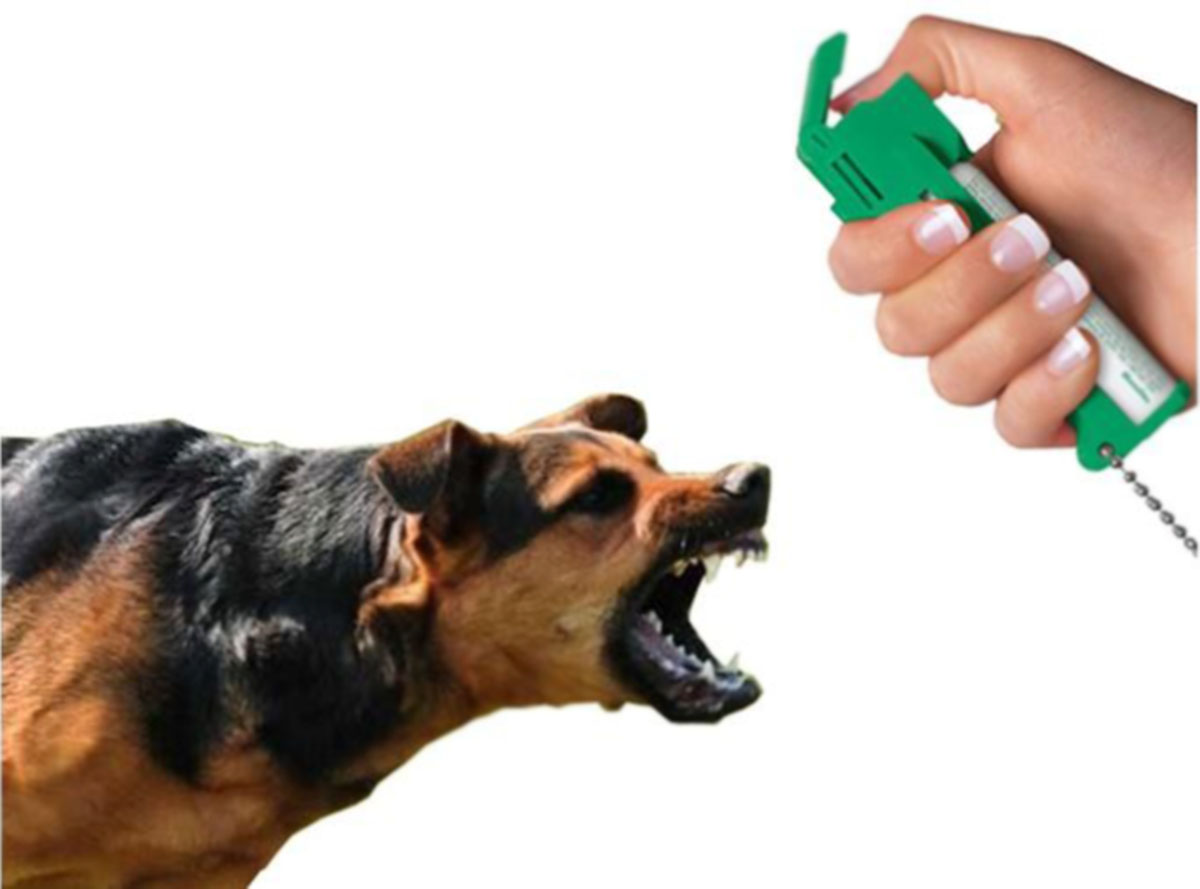Will pepper spray stop a pitbull and aggressive dog attacks & dog bites? Definitely YES based on my personal experience & as a dog owner because their noses are so sensitive, and any effective pepper spray like Fox Labs can stop any dog from 10 feet to make you secured.
Introduction: Will Pepper spray stop a Pitbull or an attacking dog?
I like pepper spray more than the stun gun as. i can use from a long distance, it is inexpensive & can repel aggressive canines without causing lasting or long-term damage or injure.
Like i just told you, the nose of the dog will not be able to adopt with the pepper smell & will walk away from you where the dog can find a clean air.
Explanation of the topic and its importance
- Need for protective measures: Many individuals seek ways to protect themselves against potential dog attacks. Pepper spray is often considered as a non-lethal weapon to disable the dog & prevent it to bite you
- Popularity among joggers and postal workers: Its easy-to-carry nature makes it popular among those who frequently encounter dogs, such as joggers and postal workers.
- Importance of understanding effectiveness: Knowing how effective pepper spray can be, specifically against strong breeds like pit bulls, is crucial for personal safety.
Overview of the effectiveness of pepper spray As Self-defense against aggressive pit bull
- Pitbulls’ strength and determination: Pitbulls are known for their strength, agility, and determination, posing a significant challenge in a dangerous encounter.
- Pepper spray as a non-lethal option: Many consider pepper spray a humane, non-lethal self-defense option. It can provide a window of escape without causing lasting harm to the animal. (How pepper spray can work on snakes)
- Variability of outcomes: There is debate regarding the consistency of pepper spray’s effectiveness, with outcomes varying depending on the situation and the dog’s resilience.

Understanding Pit bull Behavior
Traits and Characteristics of Pit bulls To Stop an Attack:
- Strong Bonds with Humans: Pitbulls are known for forming deep connections with their owners, often characterized as loyal and affectionate pets.
- High Energy Levels: They possess a natural vitality that requires regular exercise and playtime to maintain their mental and physical health.
- Remarkable Resilience: Renowned for their resilience, pitbulls can endure and recover from physical challenges with greater ease than some other breeds.
- Intelligence: Pitbulls are quick learners and can be trained effectively with consistency and positive reinforcement.
- Protective Nature: Often protective of their family, they can be wary of strangers, which lends to their sometimes misunderstood reputation.
Aggression Tendencies of Pitbulls
- Misconceptions Debunked: Despite prevalent stereotypes, pitbulls are not inherently more aggressive than other dog breeds.
- Importance of Socialization: Proper socialization from a young age is key in preventing aggressive behaviors in pitbulls.
- Role of Environment and Treatment: Like any dog breed, pitbulls’ behavior is largely influenced by their environment and the way they are treated.
- Influence of Genetics: While genetics can play a part, it is not the sole determinant of a pitbull’s disposition.
- Training and Leadership: Strong, consistent leadership and training can help mitigate aggressive tendencies in pitbulls.
- Professional Assessment: In cases of concern, seeking a professional’s opinion on a pitbull’s behavior is recommended.
In understanding the behavior of pitbulls, it becomes clear that pepper spray should be a considered response, knowing that the behaviors of these dogs are largely shaped by various factors.
By acknowledging the complex nature of pitbulls, individuals can approach situations involving these dogs with a more informed and compassionate perspective. This knowledge also aids in discerning whether pepper spray is an appropriate and effective means of defense, should the need arise.
Pepper spray’s impact on pitbulls—or any dog—should be considered alongside understanding their behavior, ensuring responsible and considerate use of self-defense measures.

Dog Pepper Spray as a Defensive Tool
What is Pepper Spray and How It Works
- Definition: Pepper spray, also known as OC (oleoresin capsicum) spray, is a chemical compound that irritates the eyes and causes tears, pain, and temporary blindness.
- Active Ingredients: The active ingredient in pepper spray is capsaicin, which is derived from chili peppers, making it a naturally occurring irritant.
- Mechanism of Action: When used, pepper spray is ejected from its canister in a stream directed at an aggressor, making it a compact and effective tool for personal defense. ( How to Use Pepper Spray For Self Defense )
- Non-Lethal: It is regarded as a non-lethal self-defense option, giving victims a chance to escape potential harm.
- Effectiveness: Pepper spray is effective against attackers by overwhelming their senses, giving individuals the opportunity to retreat to safety.
Legal Considerations When Using Pepper Spray
- Varying Laws: The legality of carrying and using pepper spray varies by location, so it’s important to understand local laws before possession or use.
- Intent for Self-Defense: Pepper spray is generally intended for self-defense purposes. Its use should align with this intention to avoid legal repercussions.
- Responsible Use: Users should exercise caution and ensure responsible use, only deploying pepper spray when genuinely threatened.
- Carry Permits: Some regions may require a permit or have restrictions on the size and strength of pepper spray canisters allowed.
- Age Restrictions: There are often age restrictions on who can legally purchase or carry pepper spray.
In conclusion, individuals considering the use of pepper spray for self-defense should not only be aware of how it functions, but also the legal implications of its use. It’s essential to be informed about the local regulations to ensure compliance with the law.
Moreover, anticipating the circumstances under which pepper spray should be employed aids in fostering a safe environment for everyone. Remember, pepper spray is a powerful tool and should be used responsibly as a means to protect oneself from harm.
Effectiveness when you Spray a Dog ( Can pepper spray stop an attacking dog? )
Research and studies on the effectiveness of pepper spray on dogs
- Efficacy for Defense: Studies show that pepper spray can be effective in deterring aggressive dogs, offering individuals a way to protect themselves during unexpected encounters.
- Comparative Studies: Compared to other defensive tools, pepper spray is often chosen for its non-lethal nature, which can be crucial in areas where dogs are commonly considered pets.
- Range of Effect: Researchers have found that the effective range of pepper spray can provide a safe distance between a person and an aggressive dog, minimizing the need for physical confrontation.
- Training for Handlers: For professionals such as mail carriers and delivery personnel, training on the proper use of pepper spray is recommended for maximum effectiveness and safety.
- Animal Behavior Consideration: Many studies consider the behavior and response of different dog breeds to pepper spray, emphasizing the importance of responsible use.
Potential outcomes when using pepper spray on pitbulls
- Breed-Specific Reactions: Pitbulls, known for their strength and tenacity, might react differently to pepper spray, which is crucial for those considering its use as a deterrent.
- Immediate Effects: As with humans, pepper spray can cause temporary blindness and intense discomfort in dogs, which often results in stopping an attack.
- Importance of Timing: The timing and accuracy of using pepper spray play a significant role in its effectiveness, especially with fast-moving breeds like pitbulls.
- Considerate Use: Users must be considerate of the potential for long-term effects on the animal, as the goal is to halt an attack rather than cause unnecessary harm.
- Alternatives: Some experts suggest exploring alternative deterrents in conjunction with pepper spray, especially for regular encounters with the same animals.
In conclusion, pepper spray can be an effective tool for defending against aggressive dogs when used responsibly. However, individuals should consider the specific circumstances, types of dogs they may encounter, and the animal’s welfare. Being informed about the most humane and effective way to handle such encounters paves the way for creating safer interactions between humans and dogs alike.

Factors to Consider To Make Pepper Spray Work
Size and Strength of the Pitbull
- Dog’s Robustness: Pitbulls are known for their muscular build, which can impact how they respond to pepper spray compared to smaller, less resilient breeds.
- Endurance Levels: The natural endurance and pain threshold of pitbulls may affect the duration and effectiveness of pepper spray, with some dogs possibly powering through the initial effects.
- Assessment of Danger: The size and strength of the animal should help gauge the level of threat, which in turn guides the appropriate response and use of pepper spray.
Proximity and Accuracy When Using Pepper Spray
- Safe Distance: The effectiveness of pepper spray increases when used within an optimal range, reducing the risk to the user.
- Aiming Techniques: Practicing proper aiming techniques ensures the spray reaches the target, especially the face and eyes, for maximum deterrent effect.
- Wind Considerations: Being aware of wind direction can prevent blowback, which could incapacitate the user and make the situation more dangerous.
In the discourse of animal self-defense, and i believe you know the answer now of Will pepper spray stop a pitbull & keep you safe or not.
It’s vital to evaluate each situation on its own merits, considering the dog’s size, the distance between you and the animal, and ensuring accurate delivery of the pepper spray to neutralize a potential threat effectively.
Ultimately, caution, preparedness, and respect for the animal’s well-being should guide people’s decisions when it comes to employing such measures.

